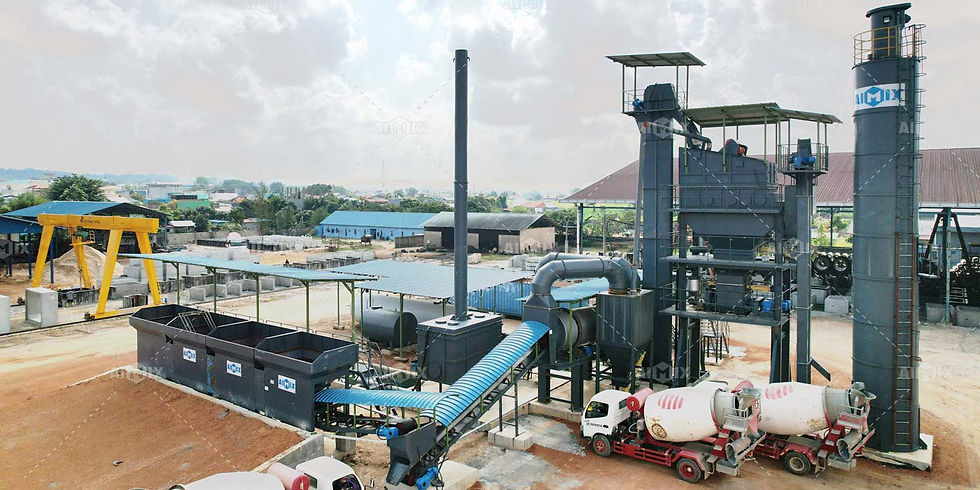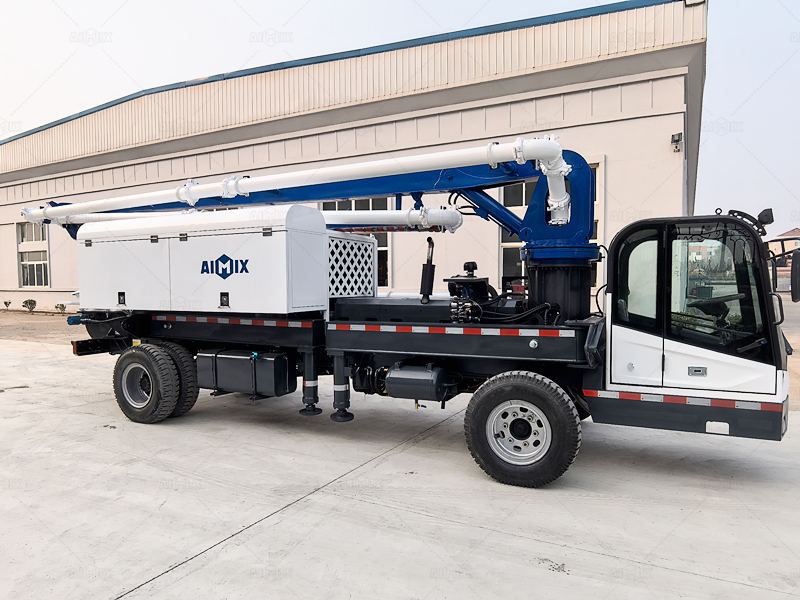Is a 100 TPH Stationary Asphalt Plant Enough for a Commercial Asphalt Supply Business?
- aimixglobal5
- Oct 16, 2025
- 3 min read
When starting or expanding a commercial asphalt supply business, one of the first questions many investors ask is: “Is a 100 TPH stationary asphalt mixing plant enough for my needs?” The answer depends on your production goals, customer base, and project scale. In this post, I’ll walk you through how to evaluate whether a 100 TPH stationary asphalt plant is the right choice for your business — and what factors you should consider before making the investment.

Understanding the Production Capacity of a 100 TPH Asphalt Plant
A 100 TPH (tons per hour) stationary asphalt plant means it can produce up to 100 tons of asphalt mixture every hour under ideal working conditions. To put this into perspective, if you run the plant for 10 hours a day, you can produce around 1,000 tons daily. This capacity is suitable for medium-scale commercial asphalt supply operations serving regional construction contractors or municipalities.
However, production capacity isn’t the only factor that matters. You also need to consider the actual market demand, delivery logistics, and the type of projects your customers typically handle. For example, supplying asphalt for small to medium urban roads or housing developments often requires less than 100 tons per hour, while large highway or airport projects may demand much more.
How to Match Plant Capacity with Market Demand
Before choosing a 100 TPH asphalt concrete plant, it’s crucial to analyze your target market. Ask yourself: How many contractors or government projects will you serve? What are their average daily asphalt requirements? Are you supplying continuously or on-demand?
If your customers usually require 500–800 tons of asphalt daily, a 100 TPH plant will meet your needs comfortably. It allows for steady production without unnecessary downtime or excessive operational costs. On the other hand, if your business plans to take on multiple large-scale contracts simultaneously, you might quickly find this capacity insufficient.
In other words, the right capacity depends on balancing two factors: steady market supply and long-term scalability. Choosing a plant that’s slightly larger than your immediate needs often helps avoid production bottlenecks when business expands.

Energy Efficiency and Cost Considerations
Another key factor to consider is energy consumption. Stationary asphalt plants with 100 TPH capacity are generally efficient in fuel use and operating costs. They strike a balance between productivity and energy efficiency, making them a practical choice for many asphalt suppliers aiming to reduce production costs while maintaining consistent quality.
Additionally, compared with smaller portable models, stationary asphalt plants are designed for long-term operation. They offer more stable temperature control and higher accuracy in aggregate and bitumen ratios, which leads to better asphalt quality and less waste.
When a 100 TPH Plant May Not Be Enough
While 100 TPH hot mix plant for sale is suitable for most regional projects, they might fall short when serving large-scale infrastructure developments. For example, if you plan to supply asphalt for major highway expansion, airport runways, or large urban expressways, you might need a 160–240 TPH stationary asphalt plant to ensure steady delivery and avoid production delays.
It’s also important to consider future growth. If your business is growing fast or you expect new government road programs in your area, investing in a higher-capacity plant might be more cost-effective in the long run. Upgrading later often costs more than starting with a scalable solution from the beginning.

Choosing the Right Configuration for Your Asphalt Business
When selecting a 100 TPH stationary asphalt plant, you should also look at the equipment configuration. Advanced plants come with baghouse dust collectors, automatic weighing systems, and high-precision burners. These features not only improve product quality but also reduce maintenance and emissions — important factors for commercial supply operations aiming to meet local environmental standards.
Moreover, the layout and land requirement of a 100 TPH stationary plant are manageable, which makes it easier to set up near major road networks or industrial zones. This helps shorten asphalt delivery time and reduces logistics costs, further improving profitability.
Conclusion: Is a 100 TPH Stationary Plant Right for You?
In short, a 100 TPH stationary asphalt plant is an excellent starting point for most commercial asphalt suppliers. It offers enough production capacity for regional projects, provides stable quality, and keeps operating costs under control. However, if your business plans to serve multiple large infrastructure projects or expects rapid growth, considering a higher-capacity model may be a smarter long-term investment.
Ready to Find the Right Asphalt Plant for Your Business?
If you’re evaluating whether a 100 TPH stationary asphalt plant suits your business model, I can help you analyze your production goals, budget, and market potential. I provide a full range of asphalt mixing plants — from 40 TPH to 320 TPH — along with professional installation and after-sales support. Let’s discuss your project needs and find the most suitable solution to grow your asphalt supply business with confidence.




Comments